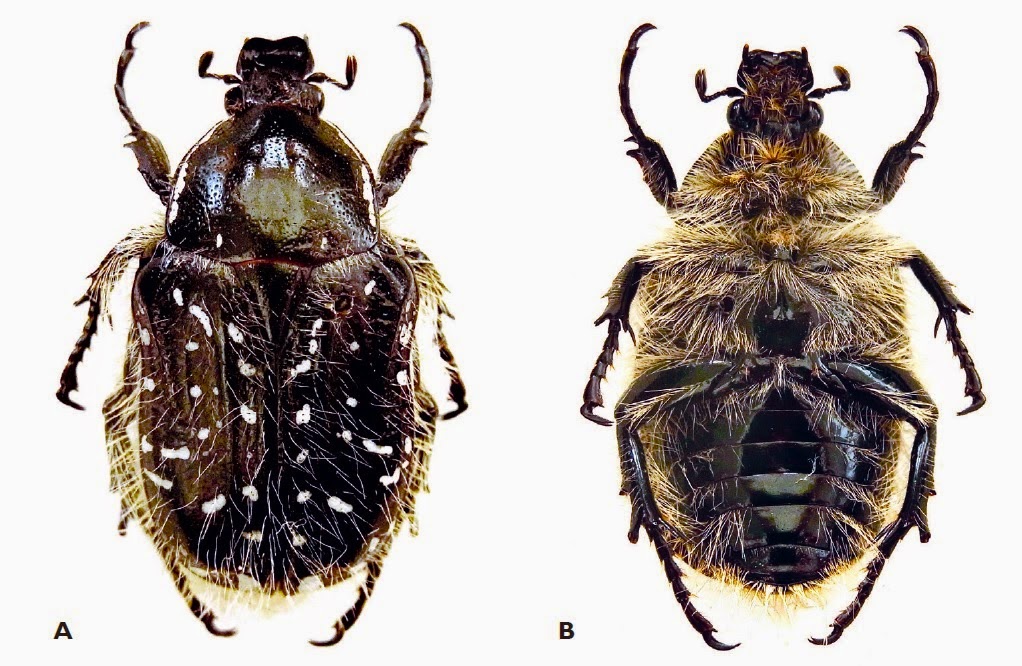There are currently eight species of Scarab
Beetles in the genus Scapanoclypeus,
which is known from Namibia and western South Africa. They are placed within a
group of Tanyproctine Scarabs which are found only in Africa.
In a paper published in the journal Zootaxa on 11 September 2014
Richard Sehnal of the Department of Zoology and Fisheries at the CzechUniversity of Life Sciences describes a new species of Scapanoclypeus from Hardap Province in Namibia.
The new species is named Scapanoclypeus hardap,
after the province where it was found. The species is described from nine
specimens, all male, collected near the village of Gochas, at an altitude of 1090 m. These
range from 8.2–9.7 mm in length and are brownish yellow with blackish brown
markings.
Scapanoclypeushardap in dorsal view.
Scale bar is 1.0 mm. Sehnal (2014).
See also…
 A new species of Scarab Beetle from the Elandsberg Mountains of the Western Cape, South Africa. Scarab Beetles of the genus Trichostetha occur across southern Africa, reaching their greatest diversity in...
A new species of Scarab Beetle from the Elandsberg Mountains of the Western Cape, South Africa. Scarab Beetles of the genus Trichostetha occur across southern Africa, reaching their greatest diversity in... A new species of Scavenger Scarab Beetle from the Early Cretaceous of Liaoning Province, China. Scavenger Scarab Beetles (Hybosoridae) are small (5-7 mm), oval Scarab
Beetles, with enlarged mandibles and mouthparts. They are typically
carrion feeders, with some species favouring vertebrate dung. They are
not a large group of Beetles, with only about 600 species...
A new species of Scavenger Scarab Beetle from the Early Cretaceous of Liaoning Province, China. Scavenger Scarab Beetles (Hybosoridae) are small (5-7 mm), oval Scarab
Beetles, with enlarged mandibles and mouthparts. They are typically
carrion feeders, with some species favouring vertebrate dung. They are
not a large group of Beetles, with only about 600 species...  A new species of Bumble Bee Scarab Beetle from the Early Cretaceous of Inner Mongolia. Bumble Bee Scarab Beetles (Glaphyridae) are small, brightly coloured
Scarab Beetles; they are active animals, and frequently resemble Bumble
Bees when in flight. There are eight extant genera in the family, two of
which have fossil records. Another two genera are known from the fossil
record only. The fossil record of the family dates back to the Early
Cretaceous...
A new species of Bumble Bee Scarab Beetle from the Early Cretaceous of Inner Mongolia. Bumble Bee Scarab Beetles (Glaphyridae) are small, brightly coloured
Scarab Beetles; they are active animals, and frequently resemble Bumble
Bees when in flight. There are eight extant genera in the family, two of
which have fossil records. Another two genera are known from the fossil
record only. The fossil record of the family dates back to the Early
Cretaceous...
Follow Sciency Thoughts on Facebook.

